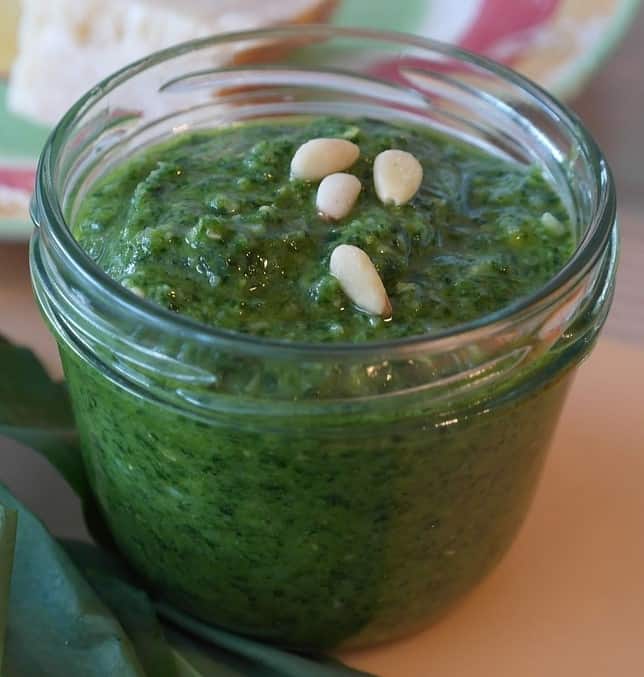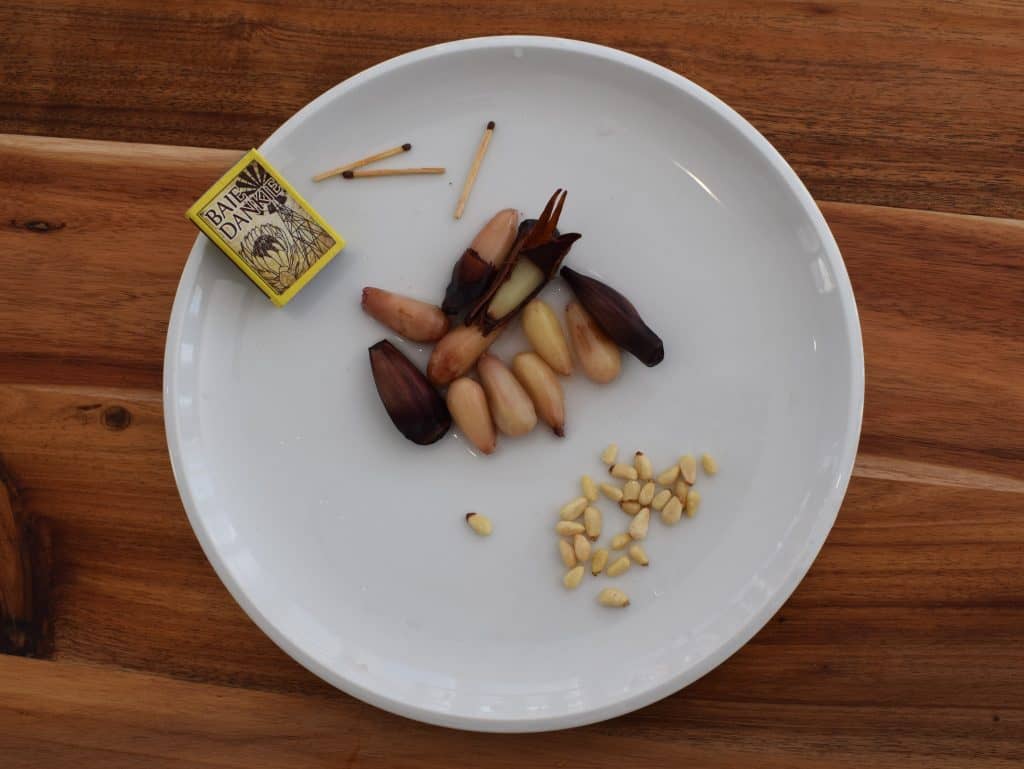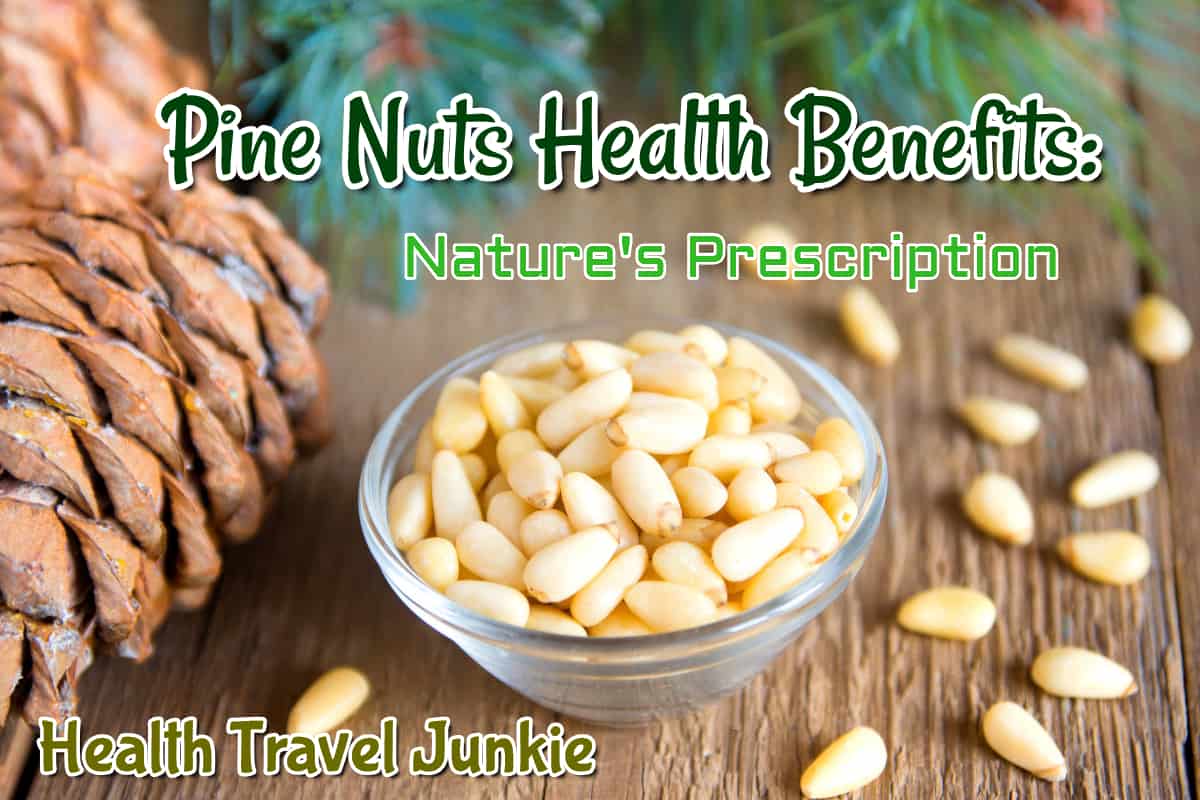Pine nuts are the edible kernels of pine cones, growing on pine trees. The extensive health benefits of pine nuts explain why its been such a popular staple food since prehistory. How do you describe the taste of a pine nut? Apart from mentioning the delicious pungent, buttery taste, you can only really say “it tastes like a pine nut”.
Pine nuts are the smallest nuts around and often the most expensive. Foraging these small pine seeds in pine forests can be a laborious task. Some classify pine nuts as a seed, instead of merely a nut. However, most nuts are actually seeds as well.
Pine trees grow all over the world, e.g. in Russia, Pakistan, China, North Korea, Europe, North America, and South Africa. At the same time, Pine nut consumption is as widespread as Pine nut production. Alternative names include pignoli, pigñolia, and pignon.
Contents
Pine Nuts Nutrient Profile
Below stats are per portion of 28.35 g (dried pine nuts)
- Protein 3.88 g (8% DV = Daily Value)
- Dietary Fiber 1 g (4% DV)
- Calories 188 (787 kj) (9% DV)
- Iron 1.57 mg (9% DV)
- Magnesium 71 mg (18% DV)
- Phosphorus 163 mg (16%)
- Potassium 169 mg (5%)
- Zinc 1.8 mg (12%)
- Copper 0.4 mg (19%)
- Manganese 2.5 mg (123%)
- Vitamin K 15.3 mcg (microgram) (19%)
- Vitamin E 2.65 mg (13%)
- Thiamin 0.1 mg (7%)
- Niacin 1.2 mg (6%)
- Riboflavin 0.064 mg (4%)
- Folate 10 mcg (2%)
- Pantothenic Acid 0.09 mg (1%)
- Vitamin B6 0.027 mg (1%)
[Source: NutritionData.com, USDA]
Health Benefits of Pine Nuts
Healthy Cardiovascular System
Nut consumption, in general, is correlated with a reduced risk of heart disease (1). The cardio-protective effects of pine nuts can be attributed to healthy unsaturated fats, along with other plant-compounds, namely phytosterols, tocopherols, and squalene (2).
A healthy cardiovascular system includes a healthier heart, lower bad (LDL) cholesterol and higher good (HDL) cholesterol, as well as cleaner arteries.
Also take note that an inverse relationship was found between Magnesium intake and Coronary Artery Calcification (an important factor in heart disease) (3). Pine nuts are rich in Magnesium. Thus keep on eating this medicine of nature to help protect against stroke and heart disease.
Weight Management
Since Pine nuts contain healthy unsaturated fats in good proportion along with the fiber and protein, it’s not likely to lead to any form of unwanted weight gain. Contrarily, consuming pine nuts may help with weight management, and act as an appetite suppressant.
Pinolenic acid in pine nuts helps with appetite control, potentially by increasing blood levels of satiety hormones. In studies done on mice reduced weight gain and fat deposition were observed when the mice were fed high fat diets along with Pinolenic acid (4).
Moreover, the fatty acids in pine nuts, initiates the release of an appetite-suppressing hormone called cholecystokinin (CCK), along with GLP-1 (glucagon-like peptide). A scientific study was done on 18 overweight women, where some were given a capsule containing Korean pine nut oil, and others a placebo. After administering the oil, scientists measured their appetite levels. The promising results indicate that Korean pine nut may work as an appetite suppressant through its effect on satiety hormones (5).
Anti-aging
Pine nuts contain a wide range of vitamins and minerals which all help keep the body young. These anti-oxidants fight free radicals and the resulting oxidative stress in your body.
Its better to get anti-oxidants in whole food form, instead of supplementing – which comes with health risks. In a study on cancer patients, anti-oxidant supplementation increased cancer mortality (instead of decreasing) (6). Thus, ideally you should grab a handful of pine nuts rather than going to the supplement counter at the pharmacy. Nevertheless, your body requires a wide variety of anti-oxidants from different fruits, vegetables and nuts (not only pine nuts).
Vitamin E, a fat soluble vitamin, also helps to promote skin health, letting you look younger while shaving off the years. Once again, use caution when taking it in supplement form. Natural sources such as pine nuts (and pine nut oil) are better.
Good for Vision
Pine nuts contain lutein, a carotenoid anti-oxidant, as well as Zeaxanthin. These two compounds keep the eyes healthy, and fights macular degeneration. Eating a handful of pine nuts every day will go a long way in boosting these eye-nourishing nutrients on the go. This is especially helpful to the elderly, who might otherwise be deficient.
Brain Health
A Norwegian community study, consisting of surveys of around 5700 adults, showed a significant inverse correlation between higher Magnesium intake, and lower levels of depression (7). They also investigated if there’s a correlation between Magnesium and Anxiety, but couldn’t find anything statistically significant.
Moreover, a formal academic review found that Magnesium could alleviate anxiety (8). Use of words like “could” and “may” suggests that one should nevertheless tread lightly when trying Magnesium supplementation to boost brain health. Instead, make an effort to get your Magnesium needs met from natural food sources like pine nuts, as far as possible (other sources include spinach, whole grains, avocados, oats, and almonds). As it stands, modern processed foods tend to be Magnesium depleted. At the same time, the modern diet contains harmful additives like MSG, and preservatives (instead of the required Magnesium). Thus, a 2010 academic review recommends increased intake of Magnesium as potentially beneficial to nearly all depressives, including those who are treatment resistant (9).
Iron, prevalent in pine nuts, is another essential mineral for mental and emotional health according to a 2014 academic review (10). Iron deficiency leads to a negative effect on brain Dopamine functions (plus a decline in overall brain health). Moreover, the same study cites Zinc, which is plentiful in pine nuts, as an essential mineral for improving emotional health and symptoms like depression, anger, mood disorders.
Pine Nuts Helps With Bone Health
Although Calcium is the most well-known mineral for bone health. Vitamin K is quite important as well. Pine nuts contain vitamin K in significant quantities. Lower bone mineral density and increased fractures occur when dietary Vitamin K intake is low (11). Although research suggests a diet high in Vitamin K may improve bone health (e.g. help protect against hip fractures in the elderly), its not conclusive that Vitamin K supplementation, will improve bone health. There are two main forms of vitamin K supplementation: K1 and K2. A 2013 study does not recommend these supplements to prevent Osteoporosis and fractures in post-menopausal women (12). Thus, to improve bone health, it’s a more solid recommendation to get this essential vitamin as part of your diet, in nature’s packaging.
Other essential pine nut minerals which keeps your bones healthy are Phosphorous, Manganese, Copper, Iron, Magnesium, Potassium and Zinc. Each of these minerals has its own unique little role to play in bone formation and maintenance. Thus getting all these minerals in your diet, is a better option than only covering your bases with Calcium.
Protein and Energy
In the Rocky mountains, grizzly and black bears compete with squirrels for this nutrient-dense energy-efficient snack (13). Apart from the obvious carbohydrate content, the fiber and protein in pine nuts will speed up your metabolism. Thus helping you stay in shape and have more energy. The healthy unsaturated fats is of course another great source of energy.
Pine nuts are rich in Zinc. In a study done on 10 male wrestlers, it was found that zinc supplementation may enhance athletic performance (14). This is due to zinc boosting testosterone levels. For women, zinc will help boost metabolism. Plus, zinc can help women to build and maintain lean muscle mass.
Pine Nuts Health Benefits for Men
The Zinc in pine-nuts is extremely beneficial to the whole male reproductive system. This includes raising libido, sexual health, and a healthy prostrate. As mentioned above, Zinc also increases testosterone levels in men, as well as encouraging more prolific hair growth.
Female Health Benefits
Of course, the Zinc in pine nuts also benefit women in the form of a stronger immune system. Plus, Magnesium is believed to be of help in alleviating female PMS symptoms. Pine nuts are also rich in Manganese – lower intake of this mineral increased PMS mood and pain symptoms in a 1993 study (15).
Mini-Conclusion
Above we are only really scratching the surface of pine nuts health benefits (one could write a whole book on this topic). The point is you need whole foods like fresh nuts to optimize your health. Once you start eating right, every facet of your health is likely to immediately start improving.
Pine Nuts Negatives
Lest we forget, every food has its negative factors as well
- You could get Pine mouth, aka Pine Nut Syndrome. This is a bitter metallic taste which begins 12 to 48 hours after consuming pine nuts, especially when eating other foods. It can last 2 to 4 weeks. Pine mouth appears to be mostly due to a specie of pine nuts found in China (Pinus armandii) (16).
- In addition, pine nuts can cause serious allergic “anaphylactic” reactions (which includes difficulty breathing and swelling). A milder reaction is also possible depending on how allergic you are. In serious cases, you’ll need an epinephrine (adrenaline) shot (phone an emergency medical number – it can be life threatening). Of course, this is only applicable to the small percentage of the population with pine nut allergy (still helpful to be aware of it). If you already know that you’re allergic to other nuts, you should, of course, be extra careful with pine nuts as well.
- Pine nuts are potentially the most expensive nut out there. In some countries, Macadamias are more expensive. However, in South Africa I’ve found Pine nuts to be the most expensive nut by far.
- If you buy pine nuts imported from overseas, it’ll most likely be irradiated to preserve the nuts. On the other hand, locally sourced nuts are often not irradiated (depending on the food regulations of your country). Irradiation diminishes the nutrient value of food while lengthening shelf life. Another problem is that imported nuts are generally less fresh than homegrown nuts (especially those you forage yourself). The nutritional value of packaged pine nuts decreases as the nuts become less fresh.
Pine Nut Pesto

Pine Nuts, along with basil, are most famous as the main ingredients in Pesto. For a vegan (dairy-free) pesto, combine pine nuts, olive oil, basil, lemon juice, garlic, and some sea salt in a blender. Voila, there’s your pesto.
Add to a salad, eat on a sandwich, pasta, pizza or any other dish you can imagine. For those who prefer dairy, add grated parmesan cheese to the pesto, instead of lemon juice.
Different Types of Pine Nuts
There are around 20 different subspecies of pine tree worth mentioning, which bear pine nuts. All of these more or less look similar, with small differences in nutrient values here and there.
According to Pinenut.com, these include:
- New Mexico pinon pine nuts (Pinus edulis): Rich buttery taste.
- Italian Stone pine (Pinus pinea): Mostly found in Europe, can be rather bland.
- Chilgoza pine nuts (Pinus gerardiana): Long seeds – good for confectionery industry.
- Chinese or Siberian pine nuts (Pinus sibirica): High oil content – needs refrigeration.
But by far the most interesting (and unusual) type of pine nut, I discovered, myself, in a southern Brazil grocery store.
Brazilian Pine Nuts

Brazilian pine nuts (Portuguese: Pinhão. Plural: Pinhões) is a very large pine nut variant. Both the taste and the look of the inner flesh remind a lot of Chestnuts. It contains as much fiber, along with a nice buttery taste. Plus, you prepare it in a similar way, thorough boiling and cooking for around 45 minutes in a pot of water (roasting is also possible). Add a pinch of sea salt to the water. Then, crack open the hard external casing, peeling over the skin at the small end of the nut. Now eat the nutritious white flesh inside.
It’s no wonder this is such a popular local delicacy and snack in southern Brazilian cities like Sao Paulo. In contrast to small pine-nuts, its very affordable as well.
This pine nut variant comes from a different (critically endangered) specie of pine tree (Araucaria angustifolia). The Brazilian Pine tree (or Parana Pine – as it is also known) is already down to only 1% of its original territory. Although Brazil’s government is trying to protect the tree, it’s unfortunately being replaced by more lucrative pine species for the timber industry. In addition, the tree is cut down by farmers to plant regular crops, as well as to sell its wood.
The nutrition value of these tasty large pine seeds will hopefully provide further incentive for its cultivation and protection.
In the below video I “taste test” and compare Brazilian Pine nuts with Portuguese chestnuts.
Conclusion: Pine Nuts Health Benefits
Pine nuts can be a valuable part to your diet. Of course, its not the only nut with great health benefits. All tree nuts are extremely healthy.
Due to price considerations pine nuts are mostly used to add an artistic touch to a gourmet meal. This is unless you have access to lower priced pine seeds, for example buying in bulk. Then again, is there a monetary value that can be affixed to good health? Why not top up your next meal with a delicious pine nut pesto, or sprinkle some pine nuts on your pizza, pasta or salad.
Lastly, try to germinate a few freshly foraged pine seeds. Not the packaged ones in the supermarket! Then plant it somewhere outside, to help preserve our edible-pine forests for future generations. Or, to get your own fresh, never-ending supply of pine seeds on your doorstep.
What’s your thoughts on Pine Nuts Health Benefits? Ever tasted pine nuts? Comment below your tips and questions for other readers!
Buy Pine Nuts Online
I-Herb is the best online health shop with worldwide shipping. Buy your Organic Pine Nuts on I-Herb. Get an up-to-date price here.


Hello
I was googling for content about pine nuts When I came across your excellent resource page.
I just wanted to say that your page helped me, I would have found the excellent resource.
Here it is in case you’d like to check it out https://www.elnodiacademy.com/pine-nuts-benefits
Also, my guide might make a nice addition to your page.
Either way, thanks for putting together your list of resources. Have a great day.